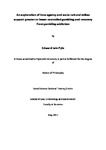An exploration of how agency and socio-cultural milieu support greater or lesser controlled gambling and recovery from gambling addiction
| dc.contributor.supervisor | Anderson, Alison | |
| dc.contributor.author | Pyle, Edward Iain | |
| dc.contributor.other | Faculty of Arts, Humanities and Business | en_US |
| dc.date.accessioned | 2017-06-15T15:11:03Z | |
| dc.date.available | 2017-06-15T15:11:03Z | |
| dc.date.issued | 2017 | |
| dc.identifier | 10067379 | en_US |
| dc.identifier.uri | http://hdl.handle.net/10026.1/9484 | |
| dc.description.abstract |
Most gamblers never experience addiction and the majority of those who do eventually recover. This thesis investigates how most maintain control over their gambling and how the majority of those who do experience gambling addiction regain control. Findings are based on 25 qualitative semi-structured interviews with participants who fit one of three ideal-type groups: (i) gamblers who have never experienced addiction; (ii) gamblers who have regained control after experience of gambling addiction; and (iii) gamblers experiencing addiction at time of interview. Participants were recruited who had never engaged in formal treatment because existing research suggests most who experience gambling addiction and/or recovery never to do so. This study is underpinned by a synthesis of Bourdieusian theory and Foucauldian-inspired governmentality literature which was used to guide the thesis and help explain gambling behaviour. Taking a Foucauldian genealogical approach, the dominant theory of addiction as a biomedical disorder is critiqued and revealed to be myth. Instead, (gambling) addiction is demonstrated to be a social construction which becomes embodied within individuals and thereby influences gambling behaviour. Consequentially, it is shown that research concerning substance use is applicable to the investigation of gambling behaviours. Given paucity of gambling research, substance-related literature is drawn upon throughout the thesis. Attention is given to research demonstrating regulation over drug use to be influenced by the social settings in which consumption takes place as well as the wider social and cultural milieus in which the lives of actors are embedded. Moreover, particular appreciation is given to literature indicating recovery from addiction to be supported by shifts in socio-cultural milieu. In contrast to most existing addictions/gambling research, the agential capacities of gamblers to shape their own behaviours, albeit in ways heavily constrained by context (or ‘structure’) are emphasised throughout the thesis. Data revealed various gambling-related strategies to help constrain gambling and minimise harm. These are examined and it is recommended that this knowledge could be used to aid development of more effective ‘harm-reduction’ style interventions and policies in ways which support less harmful patterns of gambling behaviour. However, although valuable, those with greater control tended to rely little on such strategies to manage their gambling. Instead, greater control over gambling and recovery from gambling addiction was found to have less to do with how participants gamble (e.g. whether or not they followed harm-reduction strategies) and far more to do with the wider, non-gambling-related, aspects of their lives and the nature of their subjectivities/dispositions. Principally influential were found to be the qualities of interviewees’ socio-cultural milieus. Alongside gambling, those with greater control tended to participate in non-gambling-related communities with attendant ways of thinking and cultural expectations (values/norms) that marginalise (heavier) gambling. Drawing on Bourdieusian and Foucauldian governmentality theory, it is argued that, because of their day-to-day participation in such communities/milieus, those with greater control embody mentalities and expectations which discourage riskier gambling behaviour. This, in turn, results in more ‘prudential’ subjectivities which discourage problematic gambling behaviour. Participants who had experienced recovery and many of those who had never experienced addiction revealed long-term reductions in gambling behaviour. Findings suggested these reductions (as well as recovery) to be supported by social and cultural processes, occurring over the life-course, which encourage increased participation in more ‘conventional’ life/milieus and thereby promote alterations in subjectivities in ways more conducive to control. A dual approach to discouraging problematic gambling behaviour is recommended. Although it is important to promote ‘safer’ ways of gambling (e.g. through promotion of harm-reduction style interventions and by designing gambling environments in ways to support greater constraint), it is also imperative to support the development of lives/milieus and subjectivities more conducive to control (e.g. participation in ‘conventional’ life and access to resources required to do so). | en_US |
| dc.description.sponsorship | Plymouth Drug and Alcohol Action Team (DAAT) | en_US |
| dc.description.sponsorship | Social Science Doctoral Training Centre (DTC), Plymouth University | en_US |
| dc.language.iso | en | |
| dc.publisher | University of Plymouth | |
| dc.subject | harm reduction | en_US |
| dc.subject | gambling | en_US |
| dc.subject | addiction | en_US |
| dc.subject | behaviour change | en_US |
| dc.subject | life-course | en_US |
| dc.subject | natural recovery | en_US |
| dc.subject | maturing out | en_US |
| dc.subject | Bourdieu | en_US |
| dc.subject | Foucault | en_US |
| dc.subject | Zinberg | en_US |
| dc.subject | socio-cultural milieu | en_US |
| dc.subject | drug use | en_US |
| dc.subject | recovery capital | en_US |
| dc.subject.classification | PhD | en_US |
| dc.title | An exploration of how agency and socio-cultural milieu support greater or lesser controlled gambling and recovery from gambling addiction | en_US |
| dc.type | Thesis | |
| plymouth.version | publishable | en_US |
| dc.identifier.doi | http://dx.doi.org/10.24382/801 | |
| dc.rights.embargoperiod | No embargo | en_US |
| dc.type.qualification | Doctorate | en_US |
| rioxxterms.version | NA |
Files in this item
This item appears in the following Collection(s)
-
01 Research Theses Main Collection
Research Theses Main


